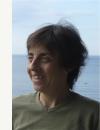Françoise Argoul is a ``self-made'' person in the sense that she has never limited her research interests in the area where she was initially trained (for instance physical-chemistry). She has demonstrated that she could span her activity spectrum up to physics and optics, electronics, computer science and more recently molecular and cellular biology. Françoise Argoul received her PhD in physical chemistry from the University of Bordeaux in 1986. Dr Argoul has authored or co-authored over 110 peer-reviewed papers. In 1990 she received a national recognition for her research (bronze medal). In 1995 she was promoted at the level of Director of research of the Centre National de Recherche Scientifique (CNRS).
She presently manages a research program devoted to the experimental characterization of the mechanical and genomic response of cellular systems under an external stress, and to the role of mechanical and dynamical parameters on the modification of cellular regulation mechanims. This program combines theoretical and experimental methods to measure by high resolution microscopies (atomic force microscopy, surface plasmon, phase contrast, quantitative phase imaging ) and to model the role of physical constraints on the route of cells to pathologies such as cancer or degeneracy. In particular, she is focusing on the role of the mechanical properties of the environmental constraints (niche) upon the response of tumoral cells to treatment (resistance).
Retrieving Data, please wait...
Retrieving Data, please wait...
|
|||||||||||||||||

